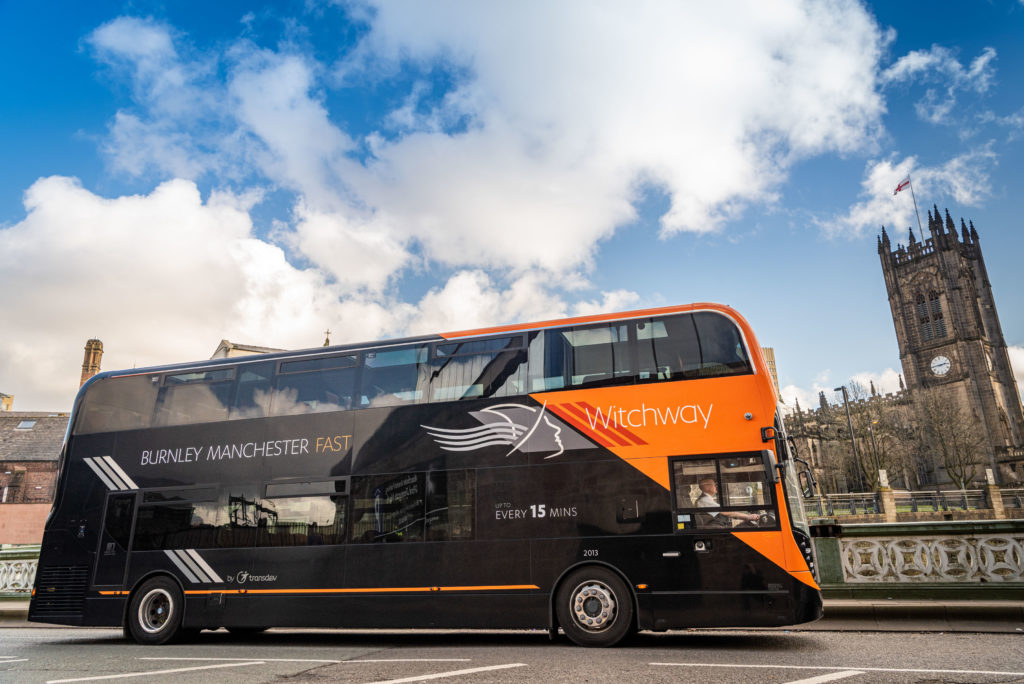Pro-public transport messages highlighted during Clean Air Day
Pro-public transport messages are being made as the industry marks National Clean Air Day (17 June 2021).
Clean Air Day, is an opportunity to improve public understanding of air pollution, build awareness of how air pollution affects our health and explain the actions we can all take to tackle air pollution, helping to protect the environment and our health. The annual campaign is led by Global Action Plan, a charity that specialises in sustainable behaviour change.
This Clean Air Day the Confederation of Passenger Transport (CPT) is calling on government to use a pro-public transport message that encourages people back onboard buses and coaches to help improve air quality.
CPT is highlighting how getting people out of their cars and onto buses and coaches is crucial to cleaning up the air we all breathe. It believes that to do this there must be messaging from government at a national level that promotes bus and coach travel as a safe, convenient, and appealing travel option.
“As we exit the pandemic, government must actively encourage and back industry efforts to get people back onboard buses and coaches rather than travelling by car” – CPT’s Head of Policy, Alison Edwards
CPT’s Head of Policy, Alison Edwards, said: “We want to improve the quality of the air we all breathe but to do that we must have less reliance on privately-owned cars. Buses and coaches are among the cleanest, greenest vehicles on our roads however to fully play their part in improving the quality of the air we breathe we need to see more people choosing to travel by bus and coach.
“As we exit the pandemic, government must actively encourage and back industry efforts to get people back onboard buses and coaches rather than travelling by car. Without a pro-public transport message from Government to help counteract some of the unhelpful messaging around public transport during the pandemic, we risk seeing continued reliance on the car, increasing air pollution and damaging our health.”
Longer-term measures that make catching the bus or coach an easy, reliable option must be implemented to support this messaging, including bus priority measures.
Alison Edwards continued: “Just one extra car journey per month by bus would result in a billion fewer car journeys each year, and a fully loaded coach can take up to 50 cars off our roads. We must see significant investment in bus priority measures and Clean Air Zones that are fair and reasonable for coaches and charge cars to enter them.”
Transport shift needed
Stagecoach is marking Clean Air Day with a call for a mass switch from cars to public transport as the country looks to emerge from the Covid-19 pandemic.
The operator cites data from DfT, which shows over the last two weekends, car traffic has been above pre-pandemic levels and as high as 108% of the position before March 2020. In contrast, use of buses outside London is currently at around 60%-70% of pre-pandemic levels.
Stagecoach has called for a major shift in transport behaviour to address health and climate challenges facing the country.
“We need a mass switch from cars to public transport, particularly buses, if we are to avoid a growing health and climate crisis” – Sharon Vye-Parminter, Health, Safety and Environment Director for Stagecoach
Sharon Vye-Parminter, Health, Safety and Environment Director for Stagecoach, said: “We need a mass switch from cars to public transport, particularly buses, if we are to avoid a growing health and climate crisis. But there are already worrying signs in our towns and cities that car use is growing rather than falling.
“Technology alone will not solve the challenges we face. We need to make real changes to how we all live our lives and there has never been a better opportunity for government and public transport operators to work together to help people make that switch.”
Transdev plays its part
North of England bus operator Transdev has highlighted it is driving forward with its mission to meet the toughest emission standards as the UK celebrates Clean Air Day.
The operator’s entire fleet is due to hit the mark of 54% Euro VI over the next few months. Of its 489-strong fleet, it has eight electric buses, 119 Euro VI vehicles and 115 buses fitted over the last year with exhaust treatment equipment to take them to Euro VI. It is due to receive 22 more to follow over the next few months. Transdev subsidiary The Harrogate Bus Company’s regular service bus fleet has become the first in the group to achieve 100% full compliance with Euro VI.
“As we continue rebuilding our regional economy beyond the pandemic, we can’t just go back to congested streets and traffic jams” – Transdev CEO, Alex Hornby
Transdev CEO, Alex Hornby, said: “We are proud to be playing our part towards protecting the environment through our continuing commitment to low emission vehicles – at the same time as we continue investing in high-specification buses that our customers are proud to be seen on.
“As we continue rebuilding our regional economy beyond the pandemic, we can’t just go back to congested streets and traffic jams. Getting back to bus will help us to tackle congestion and pollution in our town and city centres – and soon more than half of our entire bus fleet will meet the toughest Euro 6 emission standards.
“We also work closely in partnership with local, regional and national authorities, and share our expertise in electric bus operation and emission-reducing technology with other bus operators. The West Yorkshire Bus Alliance has a target to upgrade all buses to Euro 6 standard or better in the next five years – and together, we bid successfully to the Government’s Clean Bus Technology Fund to support our £8.036 million, five-year programme to make it happen.”
Commitment and contribution
Go North East is celebrating its commitment and contribution to improving its region’s air quality this Clean Air Day. It is repeating its reassurance that bus travel is safe, clean and essential to reducing congestion and air pollution.
In November the company introduced electric buses on its Voltra 53 and 54 services that operate across Gateshead and Newcastle. They attracted transport YouTuber, Geoff Marshall, who featured the state-of-the-art electric buses in one of his videos.
By its very nature, bus travel has a low carbon footprint and in addition to the electric buses, Go North East is doing everything it can to make its fleet even greener, with 61% now meeting even better enhanced environmentally friendly standards and more on the way. Its electric bus micro depot already capable of accommodating 30 electric buses.
Go North East will also be shortly trialling an electric double-deck bus at its Chester-le-Street depot.
Clean air in Nottingham
Nottingham City Transport (NCT) is celebrating its green fleet during Clean Air Day. It notes a £42m investment in recent years has helped it significantly reduce the emissions from its fleet and has contributed to Nottingham being announced as the UK city with the cleanest air.
Its commitment to reducing emissions was recognised in March when it picked up the Environmental Improvement Award at The Chartered Institute of Logistics and Transport (CILT) Awards for Excellence.
NCT’s entire fleet meets Euro VI emission standards and it runs the largest fleet of bio-gas double-deckers in the world, with 120 in total.
Passenger
Tom Quay, CEO of public transport app and website provider, Passenger comments on key tactics to convince more people to be more eco-friendly.
“In addition to ‘shock’ tactics, we need to show people how more eco-friendly practices aren’t an added inconvenience” – Tom Quay, CEO of Passenger
Tom said: “Another environmental day is upon us, providing another opportunity to boost awareness of planet-saving initiatives. Many campaigns come hand-in-hand with shocking stats about our current impact on the environment. However, is highlighting pollution levels really enough to get through to people?
“The government released a study a few weeks ago showing the 100 most polluted areas in the UK. News articles highlighted the average concentration of PM2.5 pollution particles, detailing how many areas were above the World Health Organisation limit of ten. Highlighting towns was helpful, but the technical jargon is likely to have still baffled some. For me, ‘shock’ tactics are only truly shocking if people can relate to them. For example, noting the amount of carbon dioxide produced by a 15km car journey is one thing, but equating it to the number of cups of tea you can make – 1,100 cups in this instance – is far more relatable. This is what we’ve done with our Premium app, so users can see how much impact they’re actually having in real-life terms when they take the bus.
areas in the UK. News articles highlighted the average concentration of PM2.5 pollution particles, detailing how many areas were above the World Health Organisation limit of ten. Highlighting towns was helpful, but the technical jargon is likely to have still baffled some. For me, ‘shock’ tactics are only truly shocking if people can relate to them. For example, noting the amount of carbon dioxide produced by a 15km car journey is one thing, but equating it to the number of cups of tea you can make – 1,100 cups in this instance – is far more relatable. This is what we’ve done with our Premium app, so users can see how much impact they’re actually having in real-life terms when they take the bus.
“In addition to ‘shock’ tactics, we need to show people how more eco-friendly practices aren’t an added inconvenience. The Centre for Cities think tank recently suggested that a five-day office week could be the norm again within two years. The added inconvenience of having to travel to work means people will want to take the easiest route possible – aka, their cars in most cases.
“This is why we need to make public transport as easy a solution as simply jumping in the car, whether it’s operators adopting more convenient journey planning and ticketing systems, or the government investing more in public transport to improve bus frequency and add more routes. Changes won’t happen overnight, but we need to do everything we can to convert people to an eco-friendlier lifestyle – and understanding their main decision drivers is key to this.”